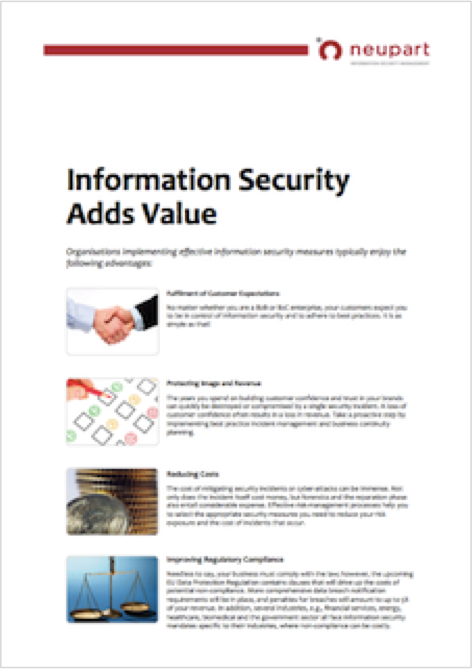You should be involved in security since security means something to your customers and because cyber attacks and security incidents are beginning to occur within all kinds of businesses. We have all seen the numerous examples of data breaches, attacks and other security incidents in the news. Often, one might expect or hope the involved organisations were better protected then they actually were. Information security is very much on the agenda, both in the business world and in the media.
Your customers, regardless of whether you sell directly to customers or to other businesses, are presently interested in the topic. That is why you as a manager and a senior executive should take an interest in whether your organisation is sufficiently prepared for a major cyber attack or a systems crash. That should be as good an argument as any! However, there are even more good reasons that I would like to share with you.
Brand image and profitability: Perhaps you have spent years slowly but surely building credibility for your brand name(s). You want your customer to have confidence in you. One security incident can quickly serve to reduce the trust and confidence you have gained to such a degree that even the best (or most expensive) image campaign will not be able to bring it back.
Fees: Add to this the enormous costs to you when you need to deal with a major security breach. Such costs are incurred both due to the incident itself and the following investigation, cleanup and restoration. Theft of company secrets and/or intellectual property rights, as well as industrial espionage can obviously be expensive and even a threat to the very existence of some companies. Afterward, it will surely be shown that more investment in preventive security measures would have made good sense and would have saved money. Moreover, since the threat will continue to develop, it would be a good investment for the future as well.
Legal Statutes: You are subject to certain legal requirements demanding that you have a sufficient level of information security. Bear in mind present and future Personal Data Acts. The future EU personal data legislation (an ordinance) is expected to passed so that it will apply in all EU Member States. It provides for companies to pay fines of perhaps as much as 5% of their turnover for computer security breaches. There is a comprehensive requirement that the parties be notified (data breach notification), which is both expensive and difficult to perform. Add to this a number of industry-specific requirements: for example, that financial enterprises must comply with financial supervisory authorities' requirements concerning information security, requirements placed on the energy sector, the health sector and for state-run enterprises to comply with the ISO 27001 standard.
Governance Requirements: Corporate governance requirements determine 1) that management set out the procedures necessary for risk management and internal inspections, 2) that the administration take a position on strategic and commercial risks and 3) that managers who negligently has caused the company to suffer damages shall pay compensation for such damages. In other words, there is also an array of legislative reasons to be interested in information security.
Review: You likely also strive for your review to be consistent with most of everything that might be found in those long review guidelines. Your information security will also be reviewed. Keep in mind as well, that regardless of the fact that accounting firms play a dubious double role (at the same time offering a wide range of both executive and advisory consultancy services within the field of information security), it pays for you to prepare for the review proactively. It should be easy for you to document that you are in control of your information security.
However, what should you as an executive do, in addition to taking an interest in the topic? Easy: You should A) communicate to your organisation that security is important, that it is a basic condition for your business activities and b) you should investigate whether you have allocated sufficient financial and human capital in your organisation to deal with the everyday, practical management of your information security.
If you want to get a little bit deeper into the subject, I recommend you examine your maturity level in these areas:
-
Policies, rules, procedures and documentation
-
Risk management (risk assessment and continual risk treatment)
-
Incident management and contingency plans
Proper governance and management of information security has become a common best practice simply because it has become a necessary condition for most commercial activities. That is why a manager should be interested in information security.
PS: Click here to follow us on LinkedIn





